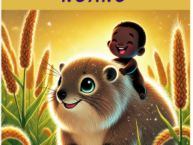Title: African Roar 2014 ; Publisher: StoryTime (Edited by Ivor Hartmann)
Reviewed by Ronald Odamolekun
 Probably, the most phenomenal feature of this anthology is that a majority of its writers are young, mostly men in their twenties yearning for expression. They are nurturing much passion for writing in arguably the most difficult of all prose forms. Ivor W. Hartmann, the anthology’s editor, is right to observe in his insightful introduction that ‘Africa, despite what anyone may say, is a continent of avid readers in many mediums, and we have a continent of storytellers to match their thirst word for word in all genres conceivable.’ The stories are stylistically varied and address a plurality of concerns. Though this collection is made up of writings from only five countries (Kenya, Uganda, Zimbabwe, South Africa and Nigeria), they are broadly representative of topical socio-political and economic trends in the western, eastern and southern regions of Sub-Saharan Africa.
Probably, the most phenomenal feature of this anthology is that a majority of its writers are young, mostly men in their twenties yearning for expression. They are nurturing much passion for writing in arguably the most difficult of all prose forms. Ivor W. Hartmann, the anthology’s editor, is right to observe in his insightful introduction that ‘Africa, despite what anyone may say, is a continent of avid readers in many mediums, and we have a continent of storytellers to match their thirst word for word in all genres conceivable.’ The stories are stylistically varied and address a plurality of concerns. Though this collection is made up of writings from only five countries (Kenya, Uganda, Zimbabwe, South Africa and Nigeria), they are broadly representative of topical socio-political and economic trends in the western, eastern and southern regions of Sub-Saharan Africa.
Obinna Udenwe’s ‘Talking to a Lizard’ reads more like a novel in the mould of Chinua Achebe than a short story. Here, a miser’s attempt to subordinate his family’s comfort on the altar of pride is resisted by robust communal values. In some way, it has a universal significance in its reproval of the current of materialism, besetting our age and times.
In Edwin P. Magezi’s ‘The Side Dish,’ a penitent Ugandan spinster is quietly grateful, realising she has been attacked with urine rather than the acid when her colleague’s wife catches her naked in bed with her husband. It is Magezi’s fervent insight into the subtleties of middle class domesticity and his facility for wry humour that make this piece particularly remarkable.
‘Flight’ by Jayne Bauling is an account of a young lady’s endurance of a humdrum job in order to support her family and student brother. Bauling’s lapidary style is achieved with sublime sensuality and precision. Indeed, it is the shortest story of this collection yet, its strongest.
A vibrant young principal, seeking to upend the socio-religious order of his school with his fierce brand of Christianity, is punished with a bee attack in ‘The Bell Not Touched’ by Nonso Uzorie.
Tendai Machingaidze, through fast-paced prose, takes a swipe at the rotting social infrastructures in postcolonial Zimbabwe and India in ‘A Salute to Safety Sam’. A Zimbabwean, on Oxford scholarship to Jaipur, laments the enormous degeneration of the traffic control systems in the two countries, a striking contrast to England where the colonisers have sustained theirs over the years.
In ‘Coming Home in a Box’ by Olorunfunmi Demilade Temitope, an affluent village chief, feigning death, unearths the plot of his grasping brother to take over his estate and the kingship he is aspiring to. The discursive narrative employs story-within-a-story and shifts in point of view in providing the missing links in the power tussle intrigues.
Ezeiyoke Chukwunonso examines the alienating nature of anti-gay sentiments in eastern Nigeria in ‘Spinoza’s Monad’. Recounted through the eye of an androgynous narrator, it tells the story of a young man – a product of artificial insemination – and his gay parents’ struggle to achieve dignity in a society that forbids their sexuality.
In ‘My Wedding Day’, Obinna Ozoigbo’s sometimes mannered prose revisits the issue of child marriage in Nigeria’s largely Islamic north. A twelve-year old girl watches as her revolutionary sister’s attempt to thwart her wedding ceremony turns bloody, resulting in her brother’s the grisly execution.
Jeremiad-like ‘Beth’s Aid’ is a poignant look at the yawning gap between the helpless poor and the callous rich in contemporary Kenya. The indomitable spirit of Tabitha Wanja Nwangi’s teenage heroine finds expression in her bid to bridge the rich/poor divide and subdue the crushing servitude that defines her parents’ lives.
It is indubitable that the collection accentuates the surging wave of interest in the short story as a convenient and robust art form for conveying several harsh realities facing the continent. This finds corroboration in V.S. Pritchett who once called the short story ‘the glancing form of fiction that seems to me right for the nervousness and recklessness of contemporary life.’ In a somewhat audacious manner, it has come to represent a viable mode of expression for these promising African writers at various stages of their craft.



1 comment for “African Roar 2014, Reviewed by Ronald Adamolekun”